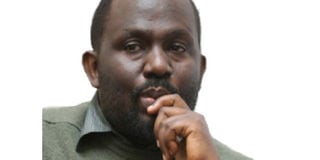Uganda memo: The road to ‘heaven’, passes through sin

There is a widespread view that the Ugandan economy is in the dumps. That it is up to its neck in debts. And the powers that be are irritated by that view.
During his State-of-the-Nation address recently, President Museveni threatened to punish Daily Monitor because the paper allows articles that argue that Uganda’s debt is too high!
How Uganda has changed!
We used to be jailed and prosecuted for articles about the UPDF, and Uganda’s alleged plunder in the eastern Democratic Republic of Congo, that were deemed to “threaten national security” and “give comfort to the enemy”.
The reality though is that we are seeing evidence that Africa will not build itself out of poverty. A wonderful article on the online publication The Elephant by Kenyan economist David Ndii, explores this in respect of Ethiopia, and the reasons why Ethiopia’s new prime minister Abiy Ahmed is rushing through at breakneck speed a series of economic and political reforms.
Ethiopia has had one of the most impressive infrastructure-building binges in the world, and posted dizzying growth from it. But it has come to nothing for the ordinary folks, and left the country in a mountain of crushing debt. As Ndii notes, much like Museveni thinks electricity is the solution, the Ethiopians had even grander plans.
Addis Ababa has over the years doubled electricity generation from 1,800MW to 4,200MW, but there is only peak power requirement of 2,000MW. There is close to 7,000MW of new power projects under construction, so what will happen to it? Electricity, roads, and railways are critical, but they are not the killer app in Africa. Consider this:
I sat on the Africa advisory board of a giant American company, and one time we intended to hold an event in Nigeria, and it became impossible, and they couldn’t grant visas to all the people involved. We took it to Rwanda where we were sure all the Africans would be allowed in.
Rwanda is making a big push to become a conference capital of Africa, with big investments in hotels, conference centres, and shortly an airport. We stayed at two posh hotels.
I was interested to see the things about Rwanda that would most impress our diverse party. Most were impressed by the cleanliness, especially the Nigerians. We drove out of Kigali, on a “no-car” Saturday. You need special permission for that. We passed through two police roadblocks, and the fellows were amazed that both had copies of our permit. Ours were the only cars on the road. “This can’t work anywhere else in Africa”, was the verdict.
So three things: The neatness and orderliness; effective law enforcement; and the fact that for the first time, some of the Africans were arriving at the airport in an African country and getting a stamp to enter without hassle precisely because they were Africans. Not a single person mentioned the facilities and hotel – they had seen equal or better. The thing about this is that achieving these three things cost Rwanda the least of their expenditures.
Uganda, let’s say we are a “mess”. But that has its advantages. Ask the chaps who hold events like the Nyege Nyege Festival. Some of the incompetence and care-free culture we see in Uganda has allowed an attractive subversive freedom to emerge, that many in the world find attractive.
A friend who works for a big British organisation told me when they hold their Africa board meetings, they often take them to Kigali. But when they have events for the younger mid-level managers and conferences, they prefer Kampala “because the place has serious life”.
In other words, Kampala’s sinful side, is very attractive for the hot-blooded of the world. For these fellows, it doesn’t matter whether they come by wheelbarrow through the border or the new Kampala-Entebbe Expressway. All they care about is the freedom to roll in the mud and smoke a little weed at Nyege Nyege.
Achieving these things, costs the Museveni government virtually nothing.
A musician friend in Nairobi has a very lucrative business, and people travel from all over the world to come to it. He has a couple of nice dreams. He brings chairs and puts them in a circle and the group drums together with their eyes closed and allow their minds to wander. Apparently it is therapeutic and uplifting. It takes place in a small old forest in Nairobi. But it wouldn’t be happening if brave environmentalists hadn’t won a battle to save it in the 1990s, and subsequent governments hadn’t left it alone.
We need the electricity, hotels, railways, and roads, for sure. But if the government wants demand for these services that will enable them pay back, they need to do – or permit - the smart simple inexpensive things.
Mr Onyango-Obbo is the publisher of
Africa datavisualiser Africapedia.com and explainer site Roguechiefs.com.
Twitter@cobbo3




